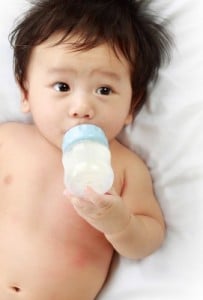
Based on a survey of about 1,900 babies in the United Stated, infants who were fed from the breast gained less weight than infants who were fed exclusively by bottle. Mothers of the infants were surveyed on their infants’ weights at different ages, breastfeeding frequency and whether they pumped or used formula.
According to the results, infants who were fed from a bottle, breast milk or formula, gained about three ounces more per month compared to infants that were solely fed from the breast. Interestingly enough, babies who were given only human milk but were fed both at breast and by bottle gained no extra weight, and infants fed both at the breast and by bottle with formula grew similar to infants fed solely at the breast.
Researchers are uncertain as to why only infants who were bottle fed exclusively gained more weight, but they believe it may have something to do with the infant having an active role in deciding how much to eat.
“If babies are fed by the breast, the baby plays a very active role, because they are the ones who decide when to suckle and when to stop,” said lead author of the report, Ruowei Li of the United States Centers for Disease Control and Prevention. In contrast, infants who are bottle fed are more likely to be pushed to finishing the bottle, even if they don’t really need or want it. “The key message out of this study is that breastfeeding really is the first feeding choice for the babies.”
Current recommendations regarding breastfeeding, as outlined by the World Health Organization and American Academy of Pediatrics is for infants to be exclusively breastfed for the first six months of life and for breastfeeding to continue until 12 months of age as table foods are introduced into the infant’s diet.
Recommendations, of course, are just that. They are an ideal, not a requirement. For one of any billions of reasons, a family might not find it possible to follow the recommendations to the letter, and health experts recognize this, and parents (particularly mothers) should not feel ashamed if they fall short in one area or another.
“There were millions of babies raised on formula well before the obesity epidemic started,” stated Jeffery Wright, a pediatrician from the University of Washington School of Medicine in his editorial linked to the CDC’s study. “Each family should weigh the benefits they see against any hassles they take to get there, and the father should be involved in that discussion.”
Related Articles:
- Researchers Warn Parents on Potential Injuries from Sippy Cups, Pacifiers and Bottles
- United States Ranked 25th of Developed Countries for Raising Children
- Flash Heating an Effective Method for Neutralizing HIV Virus in Breast Milk







I fed my baby with a bottle, don’t see any unnatural weight growth. Maybe the problem is not only in bottle feeding?
The WHO recommendation is: “Exclusive breastfeeding is recommended up to 6 months of age, with continued breastfeeding along with appropriate complementary foods up to TWO years of age or beyond.” The AAP recommendation is “at least one year”. In both cases, it is stated breastfeeding should continue beyond that for as long as mother and baby desire. The wording in this article impies that WHO and the AAP recommend breastfeeding be discontinued at one year, which is incorrect in both cases.